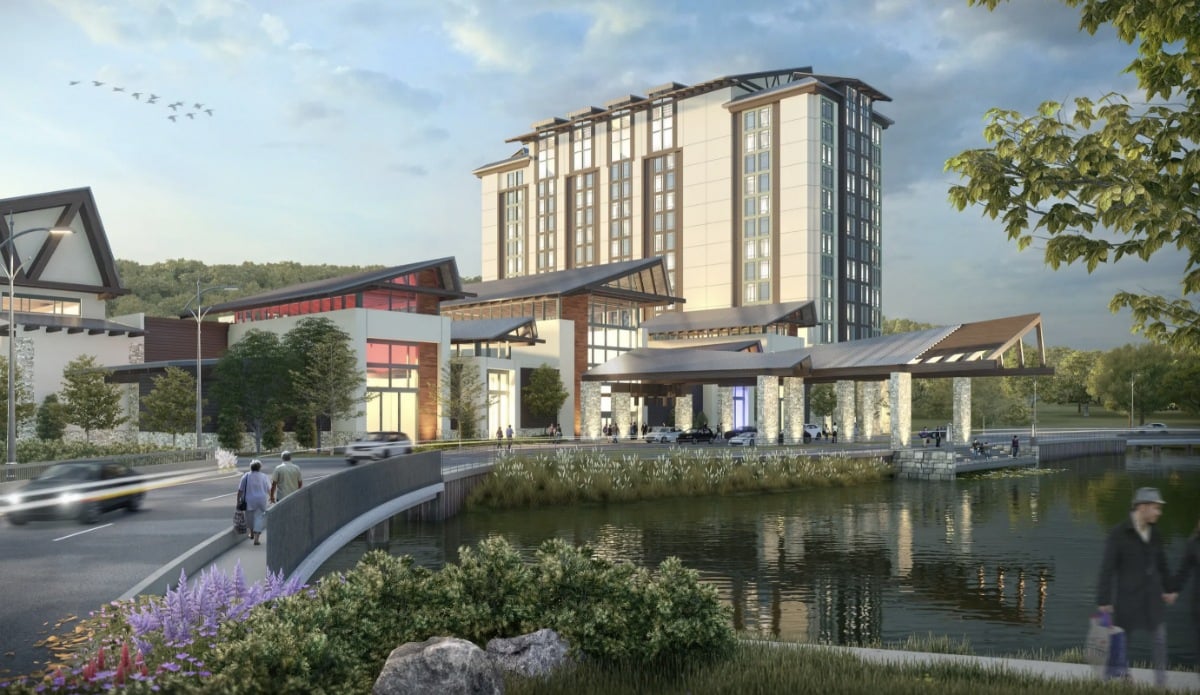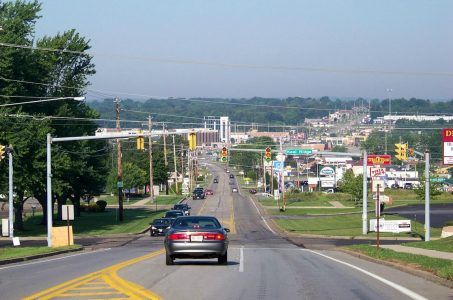Arkansas Casino Proposal Selected for Pope County, But With Controversy
Posted on: June 20, 2020, 12:33h.
Last updated on: June 22, 2020, 08:58h.
Two Arkansas casino proposals were submitted for Pope County, Arkansas, and last Thursday, the Arkansas Racing Commission picked the winning bid. It comes from Gulfside Casino Partnership, a gaming company based in Mississippi.

Gulfside Casino Partnership, owned by Terry Green and Rick Carter, was picked by the racing commission over a bid from the Cherokee Nation of Oklahoma. The seven commissioners voted 4-3 in favor of Gulfside.
The racing commissioners assigned each of the two projects a score of up to 100 points. “Experience conducting casino gaming” was worth 30 points, “time for opening casino” 10 points, “proof of financial stability and access to financial resources” 30 points, and “detailed summary of proposed casino” 30 points.
The tally came out 637-572 in favor of Gulfside.
Green and Carter’s Arkansas casino blueprint calls for a $254 million investment. The resort will feature a 500-room hotel, 80,000 square feet of gaming space with 1,900 slot machines and 90 table games, and 1,695 permanent jobs with an annual estimated payroll of $60.5 million – or $35,700 per position.
The project, called River Valley Casino, is being planned for Russellville, Arkansas.
The Cherokee plan was a $225 million investment with a 200-room hotel, a 50,000-square-foot casino with 1,200 slots and 32 table games. The project would have created 1,000 jobs, but the tribe didn’t specify an annual payroll.
Contentious Vote
The Arkansas Racing Commission’s vote to pick Gulfside over the scheme from the Cherokee Nation wasn’t without controversy. Attorneys representing the tribe questioned Commissioner Butch Rice’s vote, which he scored a perfect 100 for Gulfside, but only awarded 29 points to the Cherokee plan.
Rice’s 71-point gap was the difference in the overall 637-572 vote.
Dustin McDaniel, legal counsel for Cherokee Nation Businesses, wrote Attorney General Leslie Rutledge regarding “an obviously biased commissioner” who possessed the power to “overturn the will of the rest of the Commission.”
Despite the AG’s office expressly warning Commissioners not to engage in arbitrary, capricious, or biased scoring, Commissioner Rice in fact single-handedly overturned the score given by the rest of the Commission,” McDaniel stated. “We anticipate both an administrative appeal and a request for injunctive relief from a court. This is a uniquely significant state decision, and such an egregious act of bad faith should not be allowed to control it.”
Rice denied any bias in his voting, simply saying that Gulfside is a “better fit.”
Green and Carter are credited as pioneers of Mississippi’s riverboat gaming industry. They were inducted into the Mississippi Gaming & Hospitality Association’s inaugural Hall of Fame class in May of 2018.
They operated Copa Casino in Gulfport, Mississippi, until its destruction in 2005 by Hurricane Katrina. After gaming regulations were eased to allow riverboats to move inland, so long as they remain within 800 feet of their original barges, Green and Carter opened Island View Casino in September of 2006.
Arkansas Casinos
Arkansas voters decided to allow full-scale commercial casinos through a 2018 constitutional amendment. The state’s two racetracks – Oaklawn and Southland – have both transitioned into casinos with slots and table games.
Pope and Jefferson counties were each awarded one casino license through the referendum. Jefferson is moving forward with a $350 million casino resort being developed by the Quapaw Nation of Oklahoma. The commercial venue is called Saracen Casino Resort, and will feature a 300-room hotel, 80,000-square-foot casino with 2,300 slots and 50 table games, conference center, spa, and museum and cultural center.
Related News Articles
Connecticut Satellite Casino Blueprint Leaves Some Locals Underwhelmed
Most Popular
LOST VEGAS: ‘Tony The Ant’ Spilotro’s Circus Circus Gift Shop
Las Vegas Overstated F1 Race’s Vegas Impact — Report
Mega Millions Reportedly Mulling Substantial Ticket Price Increase
Las Vegas Strip Stabbing Near The Strat Leaves One Man Dead
Most Commented
-
End of the Line for Las Vegas Monorail
— April 5, 2024 — 90 Comments -
Mega Millions Reportedly Mulling Substantial Ticket Price Increase
— April 16, 2024 — 8 Comments -
Long Island Casino Opponents Love New York Licensing Delays
— March 27, 2024 — 5 Comments -
Tropicana Las Vegas to be Imploded, Tentative Date Set
— April 4, 2024 — 4 Comments
















Last Comments ( 4 )
You should stop and look at what your saying those things are already here there has been prostitution ever since you allowed the truck stops in the city u didnt try and stop them and the crime is steadily getting worse burgularys that nothing can be done theres a reason the crooks are out smarting you all ive seen and watched it happen ive watched the same apartment get broke into 4 times in a 3 month period.its here you just refuse to except it and to see it bye saying no you are just refusing this good beautiful town and beautiful people to grow u allowed a marrijuana dispencery that casino will not draw anymore of the things you stated then the dispencery will.
Mr. Gilbert's screaming, all caps comments appear to come straight from the Sunday morning pulpit, so I will only say "not true" to all the post apocalyptic visions of the future of Russellville. Mr. Baker, Hopefully, "thousands of people wasting time at the casinos" will become a reality; it's called entertainment. For the 3% of people identified as problem gamblers, there are programs in place to identify and assist. I am sure that Gulfside and Cherokee Nation both have these measures in place at their other properties. Much of the concern, not always stated, is that Russellville will become Atlantic City or Las Vegas. It won't. Zero percent chance in the next million years. I lived in and around Pope county for 20 years, and I have lived in Las Vegas for 18. Tunica did not become Las Vegas. Biloxi did not become Las Vegas. There is only one Las Vegas. Concentrate your efforts on being the best Russellville that you can.
WE LOVE OUR TOWN AS IS, AND DO NOT WANT A CASINO IN OUR COUNTY/CITY.. YES, IT WOULD BRING SEVERAL JOBS. BUT THE ODDS ARE ALWAYS STACKED "FOR THE HOUSE!" EMPLOYEES, AND OUR CITIZENS ALIKE WILL EXPERIENCE: POVERTY, CRIME & CRIMINAL ACTIVITIES, PROSTITUTION, INCREASE IN DEBAUTCHERY ON ALL LEVELS. WE WOULD SEE AND FEEL THE SAD FACTS OF THE INDIVIDUAL AND FAMILY DESTRUCTION IN OUR EVERYDAY LIVES! THE MORAL AND SOCIAL DECAY WILL FOREVER ROB WHAT WEVE WORKED SO HARD TO BUILD UP.. JUST LOOK AT THE CASINO DRIVEN TOWNS AROUND HERE, AND SEE THE FUTURE OF RUSSELLVILLE .. OUR HOME.. OUR CHILDRENS FUTURES.. "" STAND NOW, OR LIVE IN IT LATER " "" I SAY NO!!!!"" ❤️✌️
I would rather not have a casino in Russellville. I think it is entirely not necessary, and we will see thousands of people at the casinos wasting time and money thinking they can "win" their way out of near-poverty. It doesn't work that way. Also, even though Gulfside's proposal is for a larger casino, I'd much rather have had the Cherokee Nation get the license.